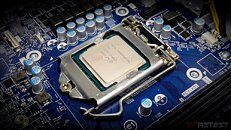Friday, February 14th 2020

Intel Core i9-10900 10-core CPU Pictured
Intel's desktop Comet Lake-S lineup is close to being released and we are getting more leaks about the CPU models contained inside it. Perhaps one of the most interesting points for Comet Lake-S series is that it brings a boost in frequency and boost in core count, with the highest-end Core i9 processors going up to 10 cores. Thanks to Xfastest, a Hong Kong-based media outlet, we have first pictures of what appears to be an engineering sample of the upcoming Core i9-10900 processor.
Being a non-K version, this CPU is not capable of overclocking and has a fixed TDP rating of 65 Watts. Compared to 125 W of the K models like the upcoming Core i9-10900K, this CPU will output almost half the heat, thus requiring a less capable cooling solution. The CPU is installed in LGA1200 socket, which is a new home for Comet Lake-S CPUs and provides backward compatibility for coolers supporting LGA1151. In the sample processor pictured below, we can see a marking on the CPU that implies 2.5 GHz base clock. Previously rumors were suggesting that this CPU version has 2.8 GHz base clock, however, it can be an early engineering sample given that no official imprints are found on the CPU heat spreader.
Source:
VideoCardz
Being a non-K version, this CPU is not capable of overclocking and has a fixed TDP rating of 65 Watts. Compared to 125 W of the K models like the upcoming Core i9-10900K, this CPU will output almost half the heat, thus requiring a less capable cooling solution. The CPU is installed in LGA1200 socket, which is a new home for Comet Lake-S CPUs and provides backward compatibility for coolers supporting LGA1151. In the sample processor pictured below, we can see a marking on the CPU that implies 2.5 GHz base clock. Previously rumors were suggesting that this CPU version has 2.8 GHz base clock, however, it can be an early engineering sample given that no official imprints are found on the CPU heat spreader.


106 Comments on Intel Core i9-10900 10-core CPU Pictured
Stress is relative I find the money for tech I want to mess with far easier than the money to pay the electric bill:p:):D.
There are a few scientists and researchers verses that opinion then.
And this also demolishes the ideology (quite true though it is) that some workloads will always favour one thread as fast as possible.
I have gamed while crunching on the same signature rig without initially realising just because of how Well thread and load management is these days.
For all the bugs and whatnot, at least AMD seems to be trying to offer a nice upgrade path.
Also it offers at least one more upgrade path possibility with Rocket lake later this year.
B350 boards run 3900x just fine and as we've seen 3950x too!
from 2nd to 3rd gen the cpu's use less power but Amd is THE platform for dyi thus they will get the most engineering time, best designs etc.
The Ryzen 3700X, a 65W TDP CPU, draws at max 74W. So only 12W below the 105W TDP Ryzen 2700X.
The Ryzen 3950X, a 105W TDP CPU, draws at max 144W.
So a board, designed for a Ryzen 2700X could be at it's Limit with a Ryzen 3950X, whereas a X570 board has still enough headroom.
Meanwhile, there are b450 boards like the asus strix-i b450 that can handle the output of a 3950x thanks to significantly higher VRM quality then some other B450 boards.
6 core = less RAM latency and overall better performance in games.
Sure if a game overwhelm a 6 core then 9900k will be faster but that's not happening now and if that's happening AMD will be much faster in that game.
Disabling HT will improve gaming performance but not too much if you are not playing old multi-threaded games like Battlefield 4. HT is not for gaming as it is really hard to optimize lightly threaded application like games to utilize SMT/HT. But it's pretty easy to avoid using HT so most dev went that way.
It's not impossible to optimize game for SMT but just really hard that economically doesn't make sense.Quick question: what's your ram latency in AIDA64 ram test? (you can do this in trail version)
Do you know that currently most games are RAM latency bounded? Intel's gaming advantage is mostly coming from better IMC that can run 4000+ rams ad have less than 40ns latency.
9900KS is not faster than 8086k in those games as less core = less latency for Intel.
In the most games Intel is clearly dominating AMD, read some Benchmarks at this stuff, and I don't think that will switch in the future, but let's see.
And here comes AMD:
If you know how to overclock then 8086k delided and repasted is the best CPU for gaming. Much better than 9900k.
Can you provide any actual figures to back yourself up or are you just going to keep asserting this everywhere you go and expect everyone to believe you?
I can not post the result as I didn't got the full result but anyone can test the 8086k vs 9900k. And it make sense as most esport title heavily rely on ram performance instead of core count.
I'm not saying 8086k is better in all games but the performance regression is indeed happening in some games especially those high frame rate esport shooters that are poorly optimized.
Did this turn into an amd thread now :p